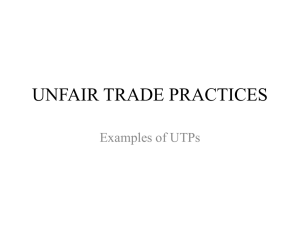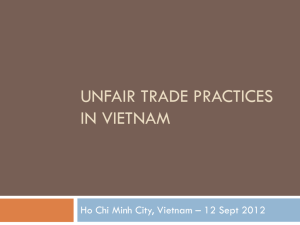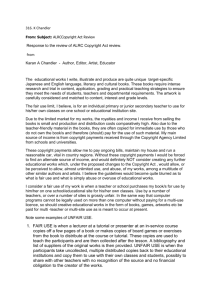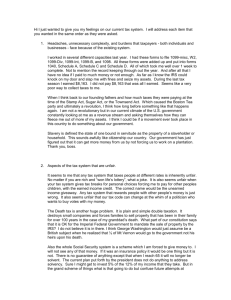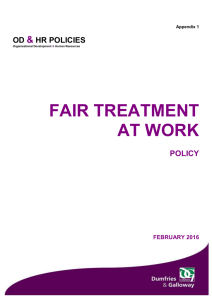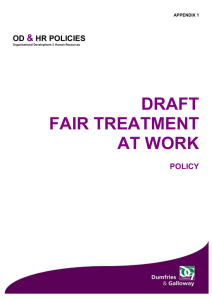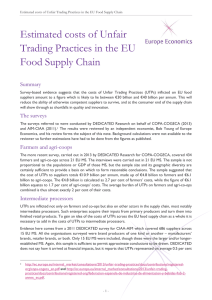Study on Unfair Trade Practices in Select ASEAN Economies
advertisement
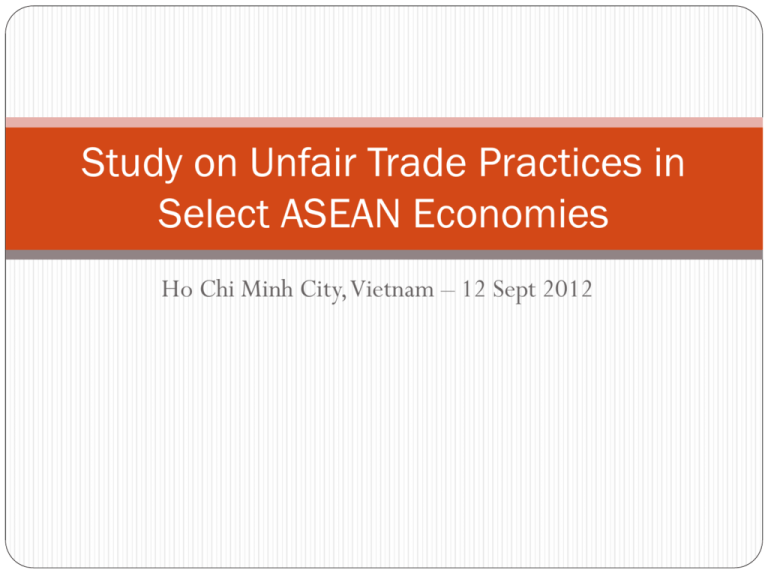
Study on Unfair Trade Practices in Select ASEAN Economies Ho Chi Minh City, Vietnam – 12 Sept 2012 The concept No universal definition of unfair trade practices available – Country- specific B2B practices: Undue use of superior bargaining power Defamation of competitors Misappropriation of trade secrets Undue interference, etc B2C practices: Misleading advertisement Bait & switch Harassment and coercion Other unconscionable conducts, including unfair contracts, etc Unfair competition practices by government agencies through abusing administrative powers The criteria The notion of ‘fairness’ Balance of interest between parties Other elements: Common standards of business ethics Bargaining power Economic injury inflicted upon victims Information asymmetries UTPs vs. other traditional antitrust issues Common law system vs. civil law system The harms Economic injury inflicted upon victims (smaller businesses, consumers) Erosion, loss of goodwill Consumer distrust towards an entire market or industry UTPs could also distort the normal functioning of the competitive markets, stop enterprises from competing by ways of innovating and serving the customers better, and pre-empt any possible equitable outcomes Is it possible to quantify the harms? Consumer Protection or Competition? Findings from 05 Project countries Please refer to the Comparative Table attached. Singapore • The Consumer Protection (Fair Trading) Act 2004, amended in 2009 • The Act gives a consumer the option to bring action against supplier in court for relief • What constitute an UTP? – To do or say anything/fail to do or say anything, if as a result a consumer might reasonably be deceived or misled – To make a false claim – To take advantage of a consumer; if supplier knows or ought reasonably to know that consumer is • Not in a position to protect his or her own interests; or • Not reasonably able to understand character, nature, language or effect of transaction or proposed transaction or any matter related to transaction • 20 unfair practices listed in the Second Schedule of the Act India • UTPs used to be regulated by both the now repealed Monopolies & Restrictive Trade Practices (MRTP) Act 1969 (from 1984) & the Consumer Protection Act (COPRA) 1986 – Significant overlaps • With the promulgation of the new Competition Act in 2002, all UTPs are transferred to being dealt with exclusively under the COPRA 1986 • COPRA, sec 2(1) (r): ‘trade practices which a trader, for the purpose of promoting the sale, use or supply of any goods, or for the provision of any service, adopts any unfair method or unfair or deceptive practice’ • Specific UTPs include misleading advertisement, bait & switch, harassment and coercion, etc Australia • Trade Practices Act (TPA) 1974 – Part V. Consumer Protection – Division 1. Unfair Practices; Division 1AA. Country of origin representations; Division 1AAA. Pyramid selling The Australian Competition & Consumer Commission (ACCC) • Competition and Consumer Act 2010 The Australian Consumer Law, Chapter 2 & Chapter 3 Specific UTPs include false or misleading representations in relation to goods, services or land transactions, bait advertising, harassment or coercion, pyramid selling, the supply of unsolicited goods or services, referral selling and falsely offering prizes United States Federal Trade Commission (FTC) Act 1914 – 15 USC § 45 (a) (1): “Unfair methods of competition in or affecting commerce, and unfair or deceptive acts or practices in or affecting commerce, are hereby declared unlawful.” The FTC Act created the Federal Trade Commission as an expert body to analyze and define “unfair methods of competition.” "It is impossible to frame definitions which embrace all unfair practices. There is no limit to human inventiveness in this field. Even if all known unfair practices were specifically defined and prohibited, it would be at once necessary to begin over again. If Congress were to adopt the method of definition, it would undertake an endless task." H. R. Conf. Rep. No. 1142, 63d Cong., 2d Sess., 19 (1914). European Union • Consumer Protection from Unfair Trading Regulations 2008 No. 1277: – These Regulations implement Directive 2005/29/EC of the European Parliament and of the Council concerning unfair business-to-consumer commercial practices (OJ No L 149, 11.6.2005, p22). – These Regulations also implement Art 6.2 of Directive 1999/44/EC of the European Parliament and of the Council on certain aspects of the sale of consumer goods and associated guarantees Regulations 2008, Part II, Regulation 3, Para (3) A commercial practice is unfair if— (a)it contravenes the requirements of professional diligence; and (b)it materially distorts or is likely to materially distort the economic behaviour of the average consumer with regard to the product. (4) A commercial practice is unfair if— (a)it is a misleading action under the provisions of regulation 5; (b)it is a misleading omission under the provisions of regulation 6; (c)it is aggressive under the provisions of regulation 7; or (d)it is listed in Schedule 1. • Schedule 1 lists out 31 commercial practices which are in all circumstances considered unfair ASEAN ASEAN Economic Community Blueprint: Towards a “highly competitive economic region”. Para 41: “The main objective of the competition policy is to foster a culture of fair competition” Introduction of competition policy in all AMSs by 2015 Forum for discussing and coordinating competition policies Capacity building A regional guideline Consumer protection: establishment of the ASEAN Coordinating Committee on Consumer Protection (ACCCP) a network of consumer protection agencies to facilitate information sharing and exchange The region is at a very initial stage of legal harmonization. Many issues remain unclear: Competition policy vs. competition law Free competition vs. fair competition Unfair competition/UTP issues Conclusions Market dynamics “One-size-does-not-fit-all” Where do UTPs fit in to consumer regulation? Are UTPs only relevant to consumers? Competition law as consumer protection regulation Should prohibitions on UTPs be included in competition laws? Regional issues specific to ASEAN: Legal harmonization vs. different economic development model sand legal systems Coordination & information sharing Thank you for your attention! For more information, please visit our website at http://utp.cuts-hrc.org/ and join our E-discussion forum on UTPs.
